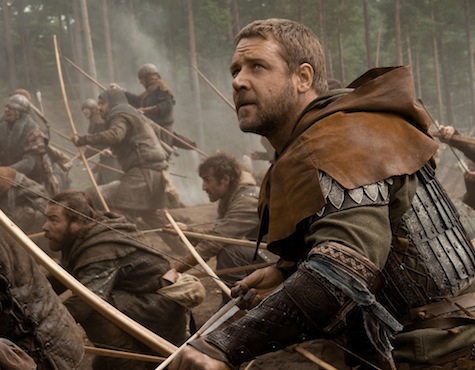I wanted to like Ridley Scott’s Robin Hood so much more than I did.
There are so many elements of the movie that I think are really clever, especially how Scott uses actual historical events to create a new plot for the familiar characters. Gone are tropes like the archery contest, dueling Little John on a bridge, wooing Marian from afar, and a climactic jail break.
In their place is the story of Robin Longstride, an archer returning from the Crusades, who impersonates a dead knight in the hopes of a free trip to England and maybe a small payday. But Robin impersonates the wrong knight, Sir Robert of Loxley, bringing him face to face with the new King John. Things get more complicated when, taking a page from The Return of Martin Guerre, Loxley’s father convinces Robin to continue the charade so that Loxley’s widow, Marian, can retain her lands. Now Robin, a thief at heart, finds himself responsible for a town, and in conflict with the local tax collector, the Sheriff of Nottingham.
That sounds like a pretty good Robin Hood plot, yeah? Unfortunately, it’s only the B plot. Because the A plot is “The Shockingly Bloody History of the Magna Carta, Oh And Also There Is Robin Hood.”
That’s right, Robin is relegated to a subplot in his own movie, so we can focus on King John’s best friend Godfrey(!). Godfrey, in the employ of Prince Philip of France(!!), leads a battalion of French soldiers around England, abusing peasants in the name of John, hoping to stir the northern barons into open rebellion. Both John and the barons are happy to go to war with each other, until Robin rides in with news of an impending French invasion(!!!) and a copy of the Magna Carta, which his dad wrote twenty years ago(!!!!). John agrees to sign, the barons choose not to rebel, and then they all go and beat up the French.
Oh! And then John declares Robin an outlaw and Robin escapes to Sherwood Forest, which means the whole two and half hour movie is an unnecessary and unnecessarily complicated origin story for Robin Hood. When the last title card came up,“And So The Legend Begins,” I actually started swearing at the screen.
It was awkward.
The movie’s not just a waste of your time, but also a waste of a fantastic cast. From Russell Crowe on down, the acting is pretty great, especially Cate Blanchett as a badass, no-nonsense Lady Marian. Scott’s direction does a great job of contrasting the carefree humor of Robin and his men with the brutal violence and grim living conditions around them. The music and cinematography are beautiful. But it’s all in service of a plot that takes too long to tell a story I don’t care about at all.
That’s why I personally dislike Scott’s Robin Hood more than Prince of Thieves. Prince of Thieves is objectively a worse movie, but it’s obviously bad so I don’t get invested in it. Robin Hood, on the other hand, is so close to being a great movie, but it’s really ruined by its terrible plot. And that’s disappointing.
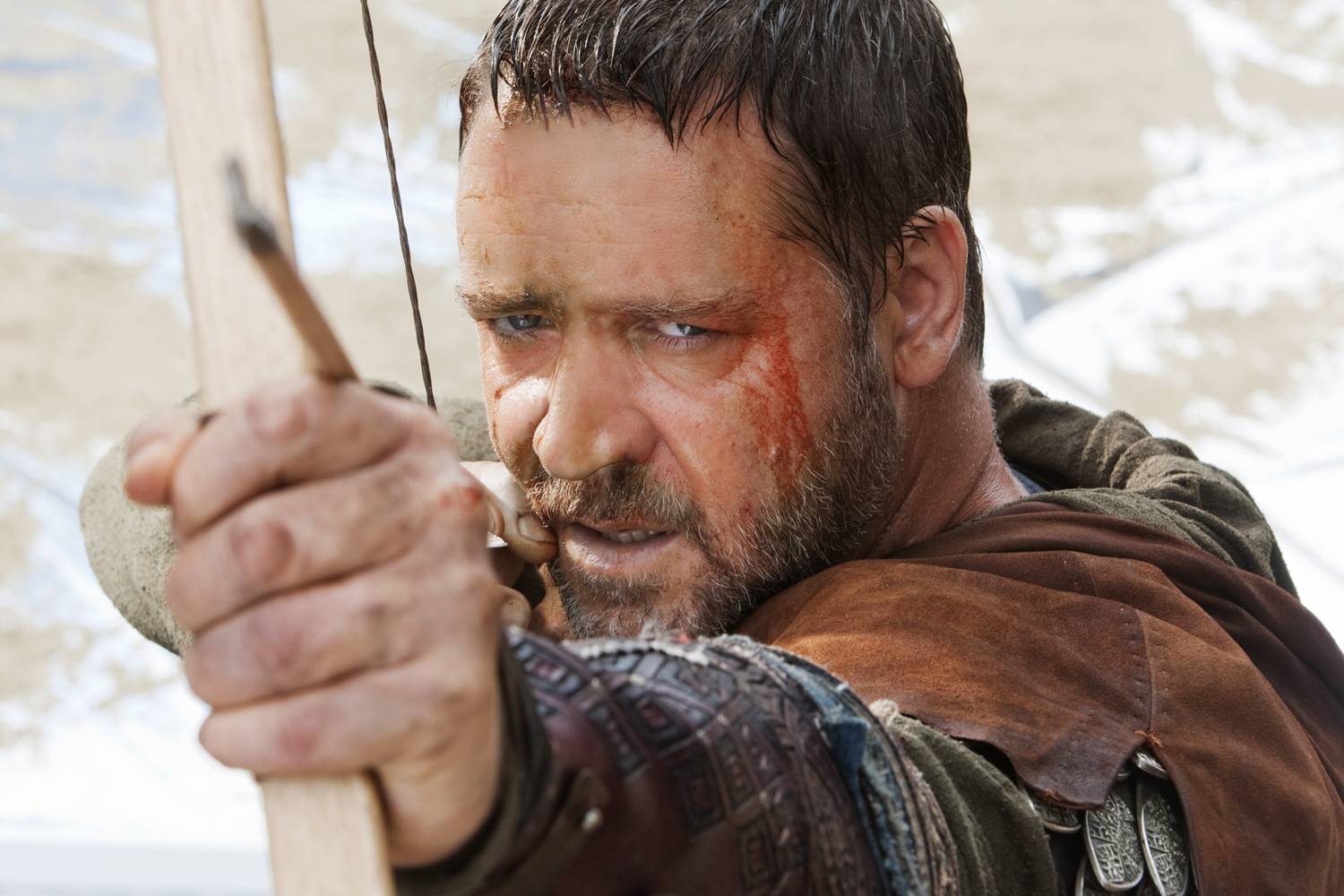
Robin Hood
I really like Crowe’s take on Robin Hood. He’s a lot more dour than the Flynn/Bedford/Elwes carefree version, but he earns his gloominess as a soldier returning from war. He’s scarred. He’s tired. He’s lost any faith he ever had that his war was just, or his king divinely chosen. And yet he’s still capable of being happy, when he’s joking with his men, or flirt/fighting with Marian, or, in the movie’s one nod to Robin being a thief, robbing the hell out of a stagecoach.
The downside to Crowe’s Robin is that, like Costner, he’s plagued by daddy issues. At first he’s disdainful of his father’s low profession. Then he’s told his father was a 12th century prototype for John Locke who believed in the equality of all men, a fact Robin conveniently forgot about due to a bout of trauma induced amnesia. Suddenly Robin is plagued with doubt about whether he can live up to his father’s example. Spoiler, he can.
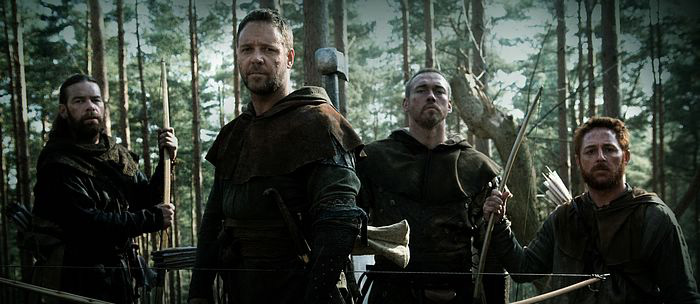
The Merry Men
The Merry Men are delightful, and again, I wish they had more screen time. Kevin Durand, who usually plays menacing goofball villains, plays Little John with a little more goofiness and a little less menace. Will Scarlett, so named for his red hair, is a lady’s man that paraphrases John Nash’s dating advice from A Beautiful Mind (“Start with the homely on the left.”) And Allan A’Dayle is played by Alan Doyle, frontman for Canadian folk-rock band Great Big Sea, which, wonderfully, turns this dark story into an honest to goodness musical.
Their collective interaction with Robin is a delightful. They’re not his army, or his employees, but his friends, and it shows. They don’t respect him or defer to him, but they do follow him simply because he usually has a good idea as to what to do next. They seem to genuinely like each other, and that’s fun to watch.
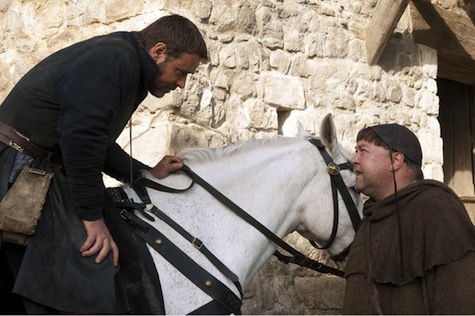
Rounding out the group, in another moment of perfect casting, is Mark Addy as Friar Tuck: former soldier, bee keeper, mead brewer, and the one who actually convinces Robin to start straight up robbing tax collectors. While he spends most of the movie as a pacifist, Tuck does take out a group of French soldiers by locking them in a church and throwing in a hive of bees. Because Tuck don’t shiv.
And, in another clever idea, the rest of the Merry “Men” are actually children, feral orphans who have taken to Sherwood Forest like the Lost Boys, with Marian as their Wendy and, eventually, Robin as their Peter Pan. The design of these children is great. Spooky when they first show up in handstitched scarecrow masks, but sickly and hungry once we see them in daylight.
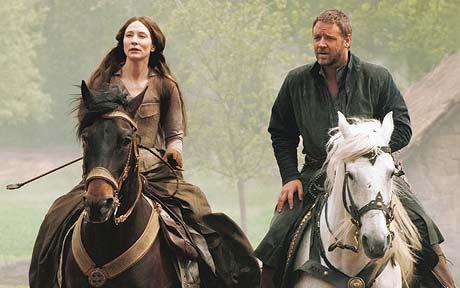
Marian
Cate Blanchett’s Lady Marian is absolutely the high point of the movie, and if the whole film could’ve been redone entirely from her perspective, the film would have won all the Oscars.
She’s phenomenal as the emotionally tough head of the Loxley household. She works the fields with her servants. She hunts with arrows, pulls goats out of the mud, chases off thieves. Bluntly told her husband is dead, she allows herself only a moment to mourn, because she has work to do.
Blanchett’s Marian is no sexless princess in a tower. She wasn’t a maid when she married Sir Robert and she explicitly says her wedding night was “short but sweet.” She doesn’t want to, but she can’t help checking out the hot man who’s shown up at her doorstep to replace her husband. (It would be great if the film had not fetishized her sexuality at all, but apparently we couldn’t get through the finale without one rape threat. At least this time Marian stabs her own way out of it.)
Her relationship with Robin is also well done. It’s not a romantic love at first sight or a balcony climbing wooing past the tower guards. They actually develop a real relationship over time, from a tense sham marriage of convenience (he gets to live like a lord, she gets to keep her lands, but they sleep on opposite sides of their room), to a level of mutual respect, as he sees how intelligent and capable she is, and she sees how involved and caring he is. When they go off to live in Sherwood in the end, it’s not the climactic escape of a couple kept apart by circumstance, but the logical next step in their growing love.
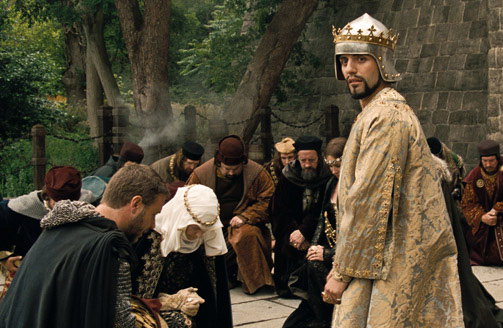
The Bad Guys
Part of the problem with the film is that it doesn’t really have that many bad guys.
King John is there, played by Oscar Isaac as an almost exact recreation of Joaquin Phoenix’s performance as Commodus in Gladiator. He’s an interesting character, half an insecure dickwad in the Sir Peter Ustinov vein—giving a reward only to immediately take it back as taxes; worrying that his mother preferred his brother to himself; wearing a crown to big for his head—and half reasonable guy—Richard did bankrupt the country to fund his crusade; marrying the princess of France is not a betrayal of his country, but a way of securing a peace treaty and begetting offspring; he does ride into battle.
He would have made an interesting, complicated antagonist for Robin, but the film only puts them in direct conflict seconds before the end. The whole “teaming up to beat up the French” might have been fun if we had seen Robin and John fighting each other first, but instead we have this story where Robin prevents a civil war and helps John retain his country, and the John turns on Robin because… well, because John’s a dick.
The Sheriff’s there too, played by a completely wasted Matthew Macfadyen. 2011’s terrible/wonderful The Three Musketeers shows Macfadyen can swashbuckle with the best of them, but here he just shows up to be a cowardly braggadocio, hit on Marian, and then run away when the French army shows up.
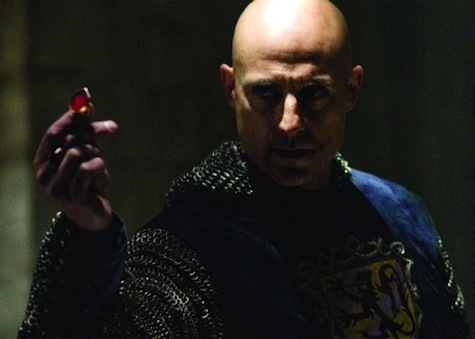
Which leaves Mark Strong’s Godfrey as the only real villain of the piece. Unfortunately, for all that John is conflicted and interesting, Godfrey is just evil. He betrays his friend and king for basically no reason. He kills Sir Robert. And he kills Sir Robert’s blind dad. And he leads an army on a raping pillaging scheme across England. And he’s a bald man with a horrifying Joker scar, so he looks like a monster. Maybe if Strong had played the part for pure camp, as Rickman did, or there was another, actually sympathetic villain, Godfrey’s pure evil could have worked. But instead he’s just a man we want to see dead, and then he dies.
Richard and the Crusades
One thing I loved about Robin Hood is that it portrayed Richard as a fat, vain, violent man whose Crusade was basically a campaign of pillaging from England to Jerusalem and back. Richard is not a great man and his return to England will not magically restore everything to good. History only remembers him that way that because certain forces, like Richard’s mother Elinore of Aquitane, begin rehabilitating Richard’s image immediately upon his death.
I love the idea of Robin opposing King John rather than Prince John because it’s both more historically accurate (John did become king, so he wasn’t arrested, exiled, or killed during Richard’s reign) and it redefines Robin’s fight as against the idea of “the divine right of kings,” not against this particular false king in favor of that true one.
Robin Hood still doesn’t deal with the religious and racial intolerance at the heart of the Crusade, but, you know what, this goddamn film is complicated enough as is.
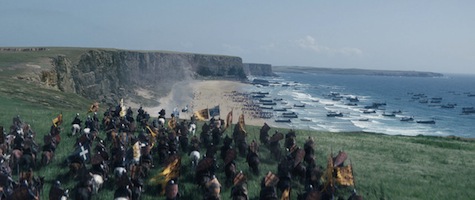
The Ending
Honestly, even if it didn’t take two hours of nothing happening to get to, the ending still might have killed this movie for me, because it’s terribly unheroic. Instead of ending on an epic jailbreak against the odds, Robin Hood ends with the English slaughtering the French invasion fleet—after Robin tortures the location of the fleet out of a French soldier by firing arrows into him (ugh).
Nothing about this battle makes the English look good. They outnumber the French fleet, and have the higher ground. Maybe if they had given the French a chance to surrender and turn around, they could have come across as chivalrous and merciful. Instead they slaughter the French. Are we supposed to root for them?
The bright spot of the ending is that Marian rides into battle with Robin, charging into the fight to take out Godfrey, who at this point has killed her husband and her father-in-law, and led an army to pillage her town. She has a very personal vendetta against this man, so, of course, she get’s knocked out so Robin can save her and kill the villain in her place. Because misogyny.
And then King John declares Robin an outlaw. And then there’s a fun scene in which Robin helps the Sheriff hang his own wanted poster by firing an arrow into it. And then there’s a title card saying “The Legend Begins” and I start barfing everywhere.
Drinking Game
This is a two drink movie at most. Scott is conscious to avoid most of the Robin Hood tropes—Robin’s not even called “Robin Hood” until the last scene. However, the plot is so complicated, and jumps around from location to location, that you’ll do most of your drinking from exposition conveyed through text.
Steven Padnick is a freelance writer and editor. By day. You can find more of his writing and funny pictures at padnick.tumblr.com.










